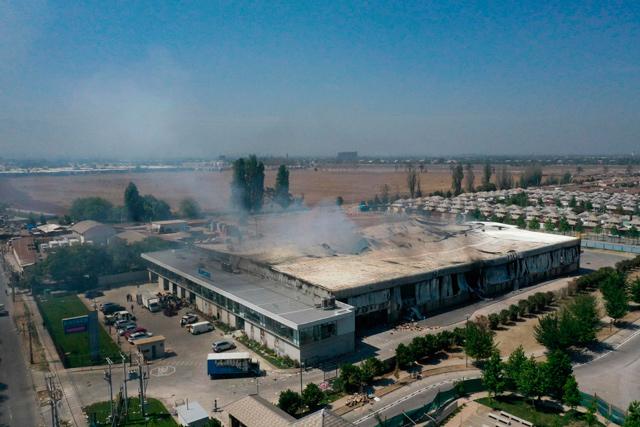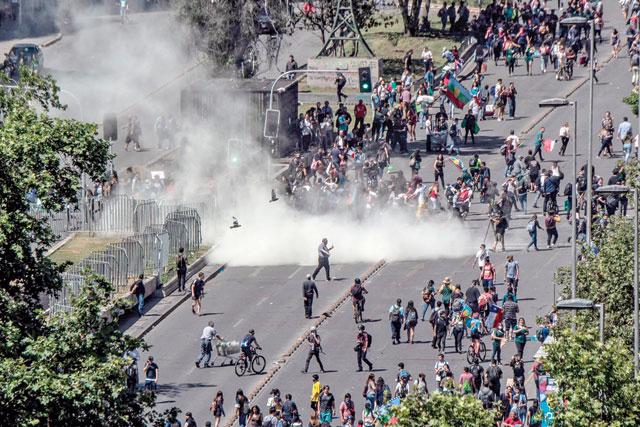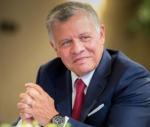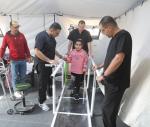You are here
Chile president to meet with parties on street violence
By AFP - Oct 22,2019 - Last updated at Oct 22,2019
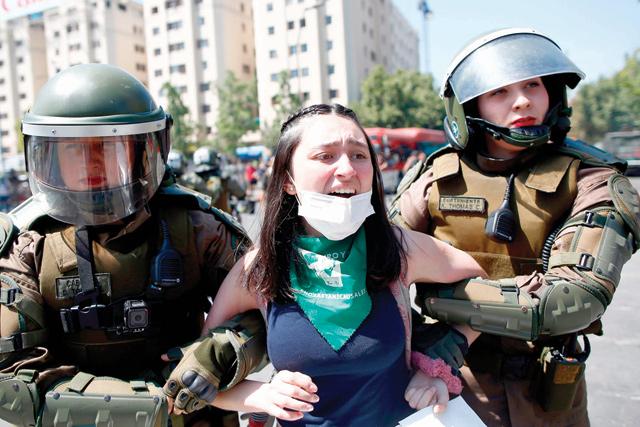
Riot police detain a demonstrator during a protest in Santiago, Chile, on Monday (AFP photo)
SANTIAGO — President Sebastian Pinera was to meet on Tuesday with leaders of Chile's political parties in hopes of finding a way to end street protests that have now claimed 15 lives.
The country's worst violence in decades erupted on Friday and was initially triggered by an increase in metro fares. But it has mushroomed into a broader outcry against social economic woes including a big gap between rich and poor in a country normally considered one of the most stable in Latin America.
The conservative Pinera declared over the weekend that the country was "at war against powerful, implacable enemy", but he adopted a more conciliatory tone Monday and said he wanted a "social agreement" to address people's grievances.
He said the meeting with political parties was to work on "a social agreement that will allow us all together to rapidly, efficiently and responsibly approach better solutions to the problems afflicting Chileans”.
The violence — with widespread looting and arson and clashes with police — is the worst to hit Chile since it returned to democracy after the 1973-1990 right-wing dictatorship led by General Augusto Pinochet.
The army has been called out to provide security as part of a state of emergency and a curfew has been in force the past three nights.
"This is not happening because they raised the metro fare by 30 pesos," said a man who gave his name only as Orlando, taking part in Monday's protests. He cited gripes including low salaries and pensions, waiting lists at hospitals and high prices for medicine.
"This has been going on for 30 years," the 55-year-old said.
The metro fare increase has been suspended but that has not stopped the violence
Transport scarce
The government raised the death toll by three on Tuesday, taking it to 15.
Eleven of the fatalities were in the Santiago region and caused by looting and arson, mainly targeting shopping centers, Deputy Interior Minister Rodrigo Ubilla told a news conference.
Three of the deaths outside the capital were from gunshots, he said.
As people returned to work on Monday, transport was a problem because only one of the metro's seven lines was running. Many stations were heavily damaged in the first night of violence.
Many schools and universities have cancelled class.
The violence overnight Monday was less intense than other nights. A drive through the city in the early hours of Tuesday showed it largely deserted except for military vehicles and police on patrol.
Earlier in several parts of the capital, protesters defiantly ignored the order and faced off with security forces.
A young man died after being hit by a military truck during the looting of a fishing company in the southern city of Talcahuano, the prosecutor's office said Monday.
Since the unrest began more than 2,600 people have been detained.
Once again on Monday, security forces — some 9,500 of which have been deployed — used tear gas and water cannon on the most unruly demonstrators.
Thousands of protesters gathered peacefully in the main Plaza Italia square in the capital on Monday, chanting "Pinera Out!" and "Get out military!"
Art teacher Camila Rojas, 29, said protesters had many demands, but "Pinera's resignation is the first thing."
And while some broke up curbs to throw stones, smashed bus shelters, looted shops, set up barricades and started fires, the vast majority in the capital were in festive mood, chanting, banging drums, paying music and dancing.
"We have to have a party to cancel out in a way those who are doing the excesses," Marcelo Gonzalez, 25, an engineering student with a drum, told AFP.
Related Articles
SANTIAGO — Chile's death toll has risen to 11, authorities said on Monday, after three days of violent demonstrations and looting that saw P
SANTIAGO — Chile pulled out of hosting two major international summits on Wednesday as it struggled to restore order after more than ten day
SANTIAGO — Billionaire conservative Sebastian Pinera will begin a second term as Chile's president in March with a strong mandate after trou


